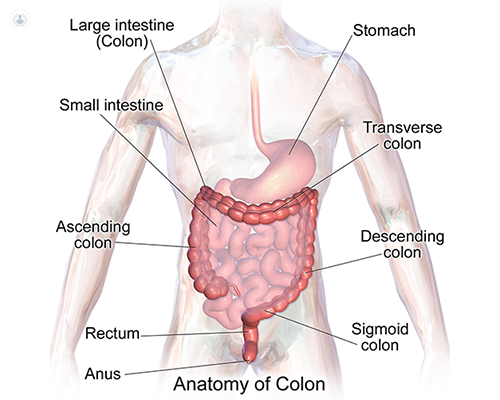Surgical Treatment of Colorectal Cancer
Written by:Once established by its general surgeon surgery is the only way of treatment for colorectal cancer, currently Laparoscopic Surgery is the chosen approach, because it gets better postoperative patient recovery results.
Sometimes laparoscopic surgery can not be performed and the patient should be treated with normal abdominal wall incisions of conventional operation. It should be stressed that the operation is the same for open and laparoscopic that involves removing the affected area and perform a complete ganglionic cleaning, to apply if a treatment after surgery is necessary route.
Laparoscopic Colon Surgery
 Through small incisions in the skin, the surgeon can practice numerous interventions on the colon. Depending on the type of intervention, the patient can be discharged a few days later, rejoining to normal life in a shorter period than if it had been operated by open surgery.
Through small incisions in the skin, the surgeon can practice numerous interventions on the colon. Depending on the type of intervention, the patient can be discharged a few days later, rejoining to normal life in a shorter period than if it had been operated by open surgery.
In most laparoscopic colon operations, the general surgeon operates through small incisions of 5 to 12 mm and observing the images inside the abdomen by a TV camera is seen on a monitor. In some cases, a small incision needs to be extended to remove the colon and finish the procedure.
Advantages of laparoscopy in colon surgery
The results of laparoscopic colon surgery vary according to the type of operation and the patient 's general condition, but the main advantages are:
- Less postoperative pain.
- Shorter hospital stay.
- Fast food tolerance.
- Rapid recovery of bowel function.
- Rapid incorporation into normal daily activity.
- Better cosmetic results.
Although colon surgery laparoscopically has many advantages, it may not be appropriate for some patients, so you should always consult with a general surgeon to determine the most appropriate technique: there are certain cardiac, respiratory and neurological diseases that contraindicate laparoscopic surgery .
Preparation for laparoscopic colon surgery
After knowing the risks and benefits of the intervention, the patient signed informed consent, may sometimes be needed a blood transfusion to reach the operation in the best conditions.
The patient must make an intense personal hygiene the day before surgery, based on performing two showers that day. The colon and rectum must be empty stool, for what will be shown taking a liquid solutions that empty and clean the Colon. If not possible to complete the preparation, the patient must serve if necessary to delay the operation.
Twelve hours before the operation, you must be in complete fasting, taking only medicinal prompted with a small amount of water if necessary. You should stop taking those medications that alter blood clotting five days before the intervention.
Procedure Colon surgery laparoscopically
The term laparoscopic surgery refers to the way the surgeon general and digestive system accesses the abdominal cavity. In this technique, the abdomen is inflated with CO2 gas to enter into the abdomen a small TV camera and instruments necessary to remove or repair the affected part of the colon.
Recovery after surgery and colon surgery
Depending on the patient 's condition and the type of operation, it will proceed to a monitoring unit or intensive or half before moving on to plant.
You may need to wear a tube through the nose until you regain bowel movements, which usually appear within the first 24 or 48 hours after laparoscopy. At that time fluid intake followed by solid successive days will start.
When the patient can walk normally it will be sent to your home. If the operation was laparoscopic, you can start normal life except for physical exercise in 4 to 10 days. Finally, you should go to consultation to remove the stitches in 10 days and the second review will be given 15 days after informing the successive revisions.


